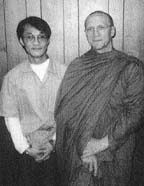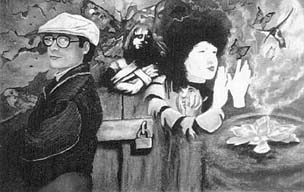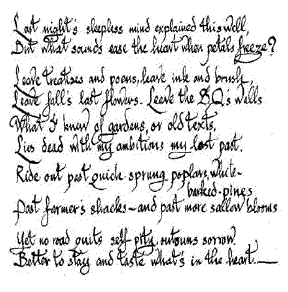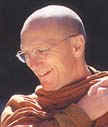|
Preparing for Death:
The
Final Days of Death Row Inmate
Jaturun "Jay" Siripongs
An interview with... Ajahn Pasanno

"You've
got to get rid of me . . . then you have to let go of yourself."
Jaturun
"Jay" Siripongs, a native of Thailand, was convicted in 1983
for the murders of Garden Grove market owner Pakawan "Pat"
Watta-naporn and store clerk Quach Nguyen. While Siripongs
admitted to involvement in the robbery, he denied having committed
the murders. Yet he refused to name his accomplice and was
convicted and sentenced to death.
Six days
before Jay Siripongs was to be executed, his friend, attorney
Kendall Goh contacted Abhayagiri
Monastery seeking a Buddhist spiritual advisor.
Two days later, Abhayagiri Co-abbot Ajahn Pasanno expeditiously
received security clearance to enter San Quentin Prison and
spent three extraordinary days with Jay Siripongs, the last
three days of Siripongs life. Jay Siripongs died by lethal
injection on February 9, 1999.
There
were many reports that Siripongs went through a remarkable
spiritual transformation while in prison. As a youth, Siripongs
had taken temporary Buddhist monastic ordination in Thailand,
a common Thai cultural practice. While in prison, he drew
upon the meditation training he had received during his ordination
and practiced consistently. Guards and inmates alike recognized
that he lived his life at San Quentin peacefully. Several
guards supported the clemency appeal for Siripongs, some openly.
Even former San Quentin Warden Daniel B. Vasquez supported
a plea for commutation of Siripongs sentence to life imprisonment.
Kathryn
Guta and Dennis Crean spoke with Ajahn Pasanno in May 1999.
Fearless
Mountain: How did you come to be called in as Jay Siripongs,
spiritual counselor?
Ajahn
Pasanno: The first time Jay expected to be executed was
November 17, 1998. At that time, he was accompanied by a Christian
minister, a woman who had attended several other executions
at San Quentin. Although Jay liked the minister very much
and had known her for years, there was a dynamic between them
that increased his anxiety. In November, in the final hours
before his scheduled death, the two talked incessantly, and
Jay was distracted from composing his mind. Jay had had a
clear sense of what he needed to do in order to prepare for
death, but he did not do it in November. Then, at the last
moment, a federal court granted a stay, and Jay was not executed
for another three months. He was very fortunate that this
first execution had been stayed. His situation and reactions
became clear to him. He wanted to make his death as peaceful
as possible, and he knew he had to do the inner work to make
it so.
For the
second execution date, Jay was determined to go to his execution
alone so that he could try to be calm and collected in his
last hours. His friend Kendall Goh was concerned about his
lack of spiritual support and offered to find a Buddhist advisor.
It was apparently not easy for Jay to ask for a different
spiritual advisor; he encountered difficulties both from San
Quentin and others, and he was cautious. I thought that his
caution was reasonable as clearly the last thing he needed
at that stage was some pious lecture from a monk. However,
immediately after we met we connected, and he was happy to
have me there.
FM:
How did it feel to serve as a spiritual counselor to a condemned
man?
AP:
At first, I felt happy to help. Then I thought, I'm going
into a hell realm, and there was a certain amount of trepidation.
There were gates, chains, a metal detector and guards. Then
there was a second metal detector, guards to stamp my hand
after I'd cleared it, then more gates and guards. Yet there
were also many conflicting images. I heard a guard call children
visitors by their names as if he knew them.
When I
saw Jay, he was not like others I have been with who are approaching
their deaths. Jay was young and healthy, in control of his
faculties. He was sharp, intelligent and talented. It was
clear he had lived the last years of his life skillfully.
Although he was waist-chained, he remained dignified. He was
gracious and hugged his visitors. The whole situation took
on a surreal quality. Everything appeared normal, but at midnight
on Monday this human being would die, he would be executed.
FM:
Was there any tension in the air considering that Jay would
soon be put to death?
_____________________________________________________
Taking
Refuge, seeing the Buddha, Dhamma and Sangha as enlightened
knowing,
truth and the embodiment of goodness. Jay was so happy that
his friends
could hear Dhamma and that he could share this with them.
_____________________________________________________
AP: Not really. The atmosphere was relaxed and not
gloomy. Sometimes we got down to the nitty gritty of the mind.
Other times we joked and laughed. On the first day especially,
Jay was a very gracious host. Prior to my arrival he had set
up a chair for me on one side of a table and for his friends
on the other side. He had instructed them very strictly on
how to behave in the presence of a monk, and he had planned
to offer a meal. He said it was the first time he had been
able to feed a monk in twenty years. In response to questions
from his friends, I talked about the Buddhist theory of awakening
using the lotus flower metaphor. I also talked quite a bit
about the meaning of Taking Refuge, seeing the Buddha, Dhamma
and Sangha as enlightened knowing, truth and the embodiment
of goodness. Jay was so happy that his friends could hear
Dhamma and that he could share this with them.
Yet I
felt very concerned that Jay look after the quality of his
own mind and not let people distract him due to their own
traumas about his imminent death. Jay recognized the dynamic
that was going on around him; he was certainly not trying
to maintain social contact because of agitation or restlessness.
Still, he realized that he had to take responsibility for
his own stability. Although he gave himself completely to
his friends during the visiting hours, he meditated many of
the other hours of the day beginning when he awoke at two
or three oh clock in the morning.
During
the days before his death, I pushed Jay into not becoming
distracted. He had a lot of visitors. I told him it's best
not to get too caught up with all these people. Kendall had
told me when I first came that Jay was doing fine, that it
was the rest of them who were falling apart. It was very obvious
that Jay had touched the lives of many people, and they gathered
around him before his death. His sister, Triya, was there.
Some of his friends considered him their spiritual teacher.
Many of his friends were lawyers, other friends were born-again
Christians. So there were many different needs, and Jay, being
kind-hearted and generous, tried to fulfill them all.

Jaturun
"Jay" Siripongs, Self-Portrait
FM: Is it true that Jay was also an accomplished artist?
AP:
Yes. Jay showed me his portfolio. He had become skilled in
many different media and was obviously talented. He also gave
away most of his art (over 600 pieces) to acquaintances and
friends over the years. Jay used art to express his process
of growing and changing. He often used butterflies as a symbol
of his metamorphosis. At some time during his incarceration,
he had realized that his life would end in prison. He thought,
I can't continue hating myself or others. During the last
eight years, Jay underwent a deep transformation and came
to a real understanding of himself. He told me that he had
been in prison for a long time and couldn't say it was a bad
thing. He felt he had been able to grow in prison in a way
that would not have been possible had he not been in such
difficult and extreme circumstances. He learned to reflect
deeply on what would create well-being and clarity in his
mind. The closer he got to the execution, the more he learned
about what would obstruct the mind from growth and peace.
He turned himself to the process of applying the mind to truth.
FM:
And this included taking up Buddhist meditation?
AP:
That's right. Jay had learned how to meditate when he was
a monk in Thailand many years earlier. While in the monastery,
he had had a very clear vision of light while meditating,
but when he had tried to replicate the experience, it didn't
come back.
FM:
That sounds like the common meditation experience of grasping
after what is pleasant.
AP:
Yes. I teased him about that. Jay then reported that three
weeks earlier the light had come back. This was very encouraging
to me. Since Jay was a visual artist, I realized that he could
use the vision of light as an anchor at the moment of his
death. I led him in guided meditations centering on the breath
and light. Since his breath would only be there until the
injection took effect, I told Jay that there would come a
time to let the breath go and focus instead on the image of
light.
FM:
How else were you able to help Jay with his inner work? Was
he afraid of death?
AP:
The first night we talked on the phone, I had asked Jay, "What's
your mental state." "I'm at peace," he said. "I've accepted
what will happen. But I still have things I want to know."
Growing up in Thailand, Jay believed in rebirth. He joked
that he wanted his ashes scattered in the sea so that they
might be eaten by fish and then the fish by humans. In this
way, he could quickly return to the human realm to continue
his work. He knew that human birth was the place where learning
was possible, a place to understand pain and joy, good and
evil, right and wrong. Growth and understanding were the results
of choices one made. Jay had made some very bad choices over
the years, but he had also made some good ones. He felt he
had learned some real lessons in this lifetime and was determined
to stay on the path of Dhamma in the next life.
FM:
Did you ever to talk to Jay about those bad choices, about
his crimes?
AP:
No, I never talked to Jay specifically about the past. There
was not enough time. I focused instead on his spiritual well-being,
on his ability to face death with as composed a mind as possible.
I was not relating to him as a person convicted of a crime.
I was relating to him as a person facing death.

Poem
from the journal of Jaturun "Jay" Siripongs
FM:
What were the last few hours with Jay like?
_____________________________________________________
On
Jay's November execution date he had been allowed a mala in
his cell,
but before giving it to him, one of the guards had put it
on the floor and stepped on it. ______________________________________________________
AP: Six hours before an execution, the prisoner leaves
his family and friends behind and goes to a very cramped cell
right next to the execution chamber. Only his spiritual advisor
can accompany him. There are six guards, called the execution
squad, in a very confined space, and people like the prison
psychiatrist and the warden also come in from time to time.
There can be a lot of intimidation from the guards right before
the execution. They might be carrying on loud conversations
or be obnoxious in other ways. They may be watching TV very
loudly just three feet away from the condemned man. On Jay's
November execution date he had been allowed a mala in his
cell, but before giving it to him, one of the guards had put
it on the floor and stepped on it. After I was strip searched,
I was taken to one of these death row holding cells. There,
Jay and I were separated into two different cells connected
only by a small corner. Right away I did protective chanting
as a way of cleaning out negative energy. "We'll take the
game away from them," I told Jay. We had planned for Jay to
ask for the Refuges and Precepts in Pali, but he mistakenly
did the chant to request a Dhamma talk instead. So I gave
a short Dhamma talk to him and the guards.
FM:
What did you talk about?
AP:
I told the story of the Buddha, just after his enlightenment,
not wanting to teach, as he thought nobody would understand.
I talked about the nature of delusion of the human world and
the liberation of the Dhamma. I talked about the Four Noble
Truths, about how letting go was not a rejection of anything.
I instructed Jay to pay attention to the arising of consciousness.
Rather than inclining the mind towards that which will result
in suffering and rebirth, I told Jay to move instead towards
relinquishment and focusing the mind. In terms of letting
go or relinquishment, we talked about forgiveness in the context
of "not self." If we haven't forgiven, we keep creating an
identity around our pain, and that is what is reborn. That
is what suffers. I asked Jay, "Is there anybody you have not
forgiven yet?" I meant the system, his parents, others. Jay
thought about it. "I haven't forgiven myself completely,"
he said softly at last. It was touching. He had a memory of
being a person who had been involved in something wrong in
the past, yet now in the present he was a different person.
It was helpful for him to see that he was not this memory
of himself, to let go of the person in the past who was involved
in the crimes. It was also interesting to see that the guards
seemed intent on what I was saying, and throughout the evening
they were actually very solicitous and respectful of both
of us.
FM:
Was Jay preoccupied with the numerous appeals to save his
life that continued during this time?
AP:
Jay did not seem concerned or worried about justice. He did
not hold out great hope for the appeals to go through. When
the final appeals were turned down, it was not a big deal.
"I'm accepting the fact that I'll be executed," he said.
FM:
What was Jay's state of mind as he got closer to the execution?
AP:
At one point, Jay asked, "If I am not the body, not the feelings,
not the mind, then what is it that is liberated?" I told him
that such a question appearing then in his mind was simply
doubt arising. When you let go of everything and experience
the peace and clarity inherent in that, you don't have to
put a name or identity on it. At another point Jay said, "I
have two people on my mind, . . . me and you." I said, "You've
got to get rid of me. I'm not going in there with you. And
then you have to let go of yourself." We really laughed about
that. Basically, I helped prepare Jay for the many distractions
that might take place during the execution. "People will be
strapping you down; things will be happening around you,"
I warned. "You need to establish the mind without going to
externals. Keep your attention within." We spent the whole
evening meditating, chanting and talking Dhamma. So in the
last hour Jay was very peaceful and able to establish his
mind firmly on his meditation object. Toward the end, we took
the time to do a ceremony of sharing merit and offering blessings,
even to the guards. After his final appeal had been turned
down, Jay also asked me to do some chanting for the lawyers
involved in his case. He had a quality of thoughtfulness right
up until the end.
FM:
Were you present at the execution?
AP:
No. That had been decided before I first visited Jay at San
Quentin. I believe that not having yet met me, Jay elected
not to have me there with him. When I read the papers the
next day, though, they reported that he lay very still during
the execution and kept his eyes closed. I found this heartening
because I felt he was composing his mind.
FM:
How did you feel after the execution?
AP:
I was very grateful to have been there. It was very humbling.
One can't help but consider what any one of us would have
done in a similar circumstance - relating to our death not
as something abstract, sometime off in the future, but knowing
that at precisely 12:01 a.m. we will definitely die.
FM:
Was there a funeral for Jay?
AP:
There was a private cremation the day after Jay died. I met
with his sister, Triya, at the crematorium. Jay's body lay
in a cardboard box. Earlier, when Triya had asked to view
his body, she had been told by the funeral director that this
was not possible. I wasn't aware of this, so I asked the funeral
director to lift the lid to the box. With some hesitation,
she lifted it. Jay was in a body bag. "There must be a zipper,"
I said. The woman searched around and said the zipper was
by his feet. She hesitated again. She said that Jay would
not be wearing any clothes. "There must be a scissors around.
It's just a plastic bag," I said. The woman brought some scissors
over and cut the bag open at the shoulders and head. It was
very powerful to view his body. He had the most serene expression
on his face. There was a brightness to his skin. He wasn't
dull or waxy. He had the tiniest bit of a smile. It was very
good to see he had died a peaceful death. After all that had
happened, it was a reassuring ending.
 ---
Ven. Ajahn Pasanno ---
Ven. Ajahn Pasanno
Ven. Ajahn Pasanno -- Ven. Pasanno Bhikkhu took ordination
in Thailand in 1974, with Ven. Phra Khru Nanasirivatana as
preceptor. During his first year as a monk he was taken by
his teacher to meet Ajahn Chah, with whom he asked to be allowed
to stay and train. One of the early residents of Wat Pah Nanachat,
Ven. Pasanno became its abbot in his seventh year. During
his incumbency Wat Pah Nanachat has developed considerably,
both in physical size and in reputation, and Ajahn Pasanno
has become a very well-known and highly respected monk and
Dhamma teacher in Thailand. Ajahn Pasanno moved to California
on New Year's Eve of 1997 to share the abbotship of Abhayagiri.
Abhayagiri
- newsletter - Pasanno
http://www.abhayagiri.org/v4n2/pasannov4n2.htm
|